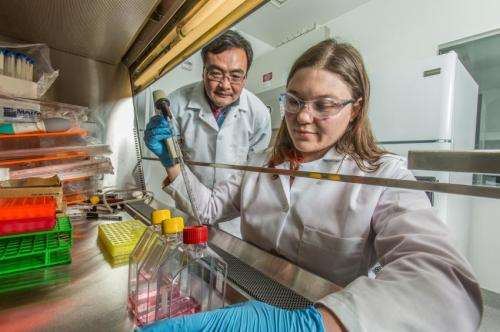University of Alaska Fairbanks awarded $18.8 million for biomedical research, education

The University of Alaska Fairbanks received an $18.8 million award from the National Institutes of Health to fund statewide biomedical research and student training focused on the interface of health, disease and the environment in people and animals.
The five-year award will continue support for an NIH Institutional Development Award Network of Biomedical Research Excellence linking university-based researchers and students from UA's campuses in Fairbanks, Anchorage and Juneau to meet both the research and workforce needs of Alaska's cities and rural communities.
"The INBRE award to UAF reflects our role as a world leader in Arctic research and the significant contributions from research at the University of Alaska Anchorage and University of Alaska Southeast," said Mark Myers, UAF vice chancellor for research. "Cheryl Frye, as INBRE's previous principal investigator, current principal investigator Brian Barnes and others have contributed toward making this a successful award."
NIH's IDeA program builds research capacity in states with historically low levels of NIH funding and supports basic, clinical and translational research, faculty development, student training and improvements in infrastructure.
"The Alaska Institutional Development Award Network of Biomedical Research Excellence has developed a research network that includes three University of Alaska campuses spanning a vast geographic area," said W. Fred Taylor, who directs the IDeA program at NIH's National Institute of General Medical Sciences. "One element of the network prepares undergraduate and graduate students, including those from underrepresented groups, for research careers—an effort that contributes to increasing diversity in the biomedical workforce. A focus of the next funding phase will be to establish a clinical translational research center to investigate the environmental factors that influence the health of Alaska Natives."
One of Alaska INBRE's goals is to increase the competitiveness of UA statewide biomedical faculty to win health and science research grants that advance knowledge and provide training opportunities for students.
"Alaska's high latitude and extreme conditions places us in a prime location for research and teaching about human health and interactions with the environment in a changing climate," said Brian Barnes, Alaska INBRE principal investigator and director of UAF's Institute of Arctic Biology. "What we do in Alaska's higher public education serves the world's population."
Other elements of the network will support faculty through seed grants for new, emerging research ideas, professional development and infrastructure. A biomedical informatics core will expand expertise and resources for collecting and analyzing biological data such as DNA.
"Our state's unique geography and population pose their own challenges from a health care perspective, and I welcome this important research to build bridges among our communities, while also highlighting the symptoms specific to one region or group," said U.S. Sen. Lisa Murkowski. "You wouldn't expect medical research in Texas to represent Minnesota concerns, so I look forward to seeing the Alaska-sized results of this holistic approach."
With the renewal of the IDeA support, UA can continue to fund the development, coordination and sharing of biomedical research resources and expertise throughout Alaska.
"I'm pleased but not surprised that UAF was selected to receive this grant," said U.S. Sen. Mark Begich. "UAF is a national and world leader for Arctic research, and this major funding announcement is more evidence of Alaska's research reputation. In addition to providing important research support, this grant means the University of Alaska will continue to recruit high-caliber students who will enrich our institutions and bring jobs and economic growth to the region."
Provided by University of Alaska Fairbanks